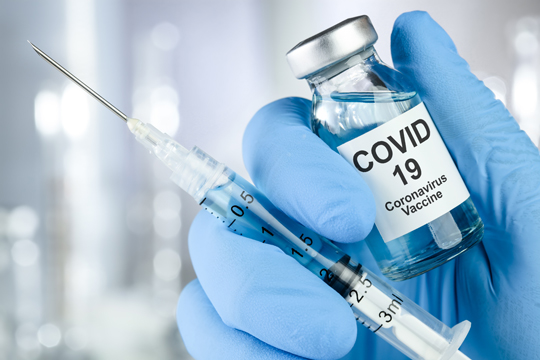Vaccines might be able to provide better protection than getting the virus
Freiburg, Aug 03, 2020
Will vaccines against the coronavirus protect us or not? As several vaccine manufacturers are reporting the first positive results, renowned research groups are pointing out that the antibodies developed in the body after infection disappear rapidly. Prof. Dr. Hartmut Hengel, Medical Director of the Institute of Virology at the Freiburg University Medical Center, believes that this could be a strategy of the virus. “Vaccines can produce better protection than infections with the pathogens themselves,” says Hengel. Whether or not vaccines against SARS-CoV-2 will be able to do this is unclear, however. The virologist fears that if they fail, the coronavirus could become a permanent fact of life. The virus’s biological program seems to be designed for people to become infected several times.
 The world is working feverishly to discover a vaccine against the coronavirus. First successes may be cause for hope, but they are no guarantee for a safe vaccine. Photo: Leigh Prather/stock.adobe.com
The world is working feverishly to discover a vaccine against the coronavirus. First successes may be cause for hope, but they are no guarantee for a safe vaccine. Photo: Leigh Prather/stock.adobe.com
We’re in a paradoxical situation. On the one hand, we’ve seen an increasing number of first successes: Manufacturers from China, Germany, the UK, and the US have published studies in renowned scientific journals about the first clinical tests of vaccines with mRNA and viral vectors that produce antibodies against SARS-CoV-2 while causing very few side-effects. On the other hand, several groups of researchers have observed that the amount of antibodies produced against the coronavirus after an infection can decrease rapidly and significantly. Hengel suspects that this could be a strategy of SARS-CoV-2. “My theory is that the virus interferes with immune cells,” he says. In other words, the pathogen seems to manipulate the human immune system.
A bag of molecular tricks
Viruses like to use molecular tricks to disrupt the immune response during an infection. For example, HIV paralyzes certain vital immune cells, while Ebola fends off antibodies with virosomes (virus-like particles), and the rhinovirus, which causes the common cold, forces cells to send confusing signals. How SARS-CoV-2 possibly weakens immunological memory is still unclear. “We haven’t even completely figured out yet which immune cells produce antibodies in this specific situation,” says Hengel, who is also president of the Virology Society (Gesellschaft für Virologie). He believes memory B cells (MBCs) or plasma cells could be possible candidates. However, he deducts from the rapid decrease in the amount of antibodies “that the biological program of SARS-CoV-2 seems to be geared toward reinfection.”
In other words, people are meant to be infected several times. That is why the coronavirus seems to makes sure that certain memory cells in the immune system do not cooperate as well normal, lose their function, or even die. Immunological memory becomes damaged, as if it has Alzheimer’s. This results in the amount of antibodies against SARS-CoV-2 decreasing. There are other viruses that also attack the body’s immunological memory. “Just how long antibodies are present apparently depends on the type of pathogen,” says Hengel. With measles or yellow fever, recovering from an infection or having been vaccinated can be enough to protect you, ideally for your entire life. For tick-borne encephalitis (TBE), on the other hand, the German Standing Committee on Vaccination (STIKO) recommends getting a booster vaccine every three to five years. Then there is HIV, for which the scientific community still has not succeeded in finding a vaccine.
“We just need to stay patient”
“If we aren’t able to contain the spread of SARS-CoV-2 through vaccines, the virus will probably continue to circulate permanently in the future,” says Hengel, who for ten years was also a member of the STIKO and is currently the vice-chair of the Scientific Advisory Board of the Federal Institute for Vaccines and Biomedicines (Paul-Ehrlich-Institute). However, there are still grounds for hope. While antiviral vaccines may contain selected parts of the pathogen or its DNA, they usually do not carry their bag of molecular tricks. This means that vaccines boost the immune response without obstructing it. “That is why vaccines can produce much stronger immune responses than the pathogen itself,” says Hengel. So-called adjuvants can enhance this effect and boost immune protection even more.
 “In order to make sure quality and safety are provided, the vaccine must be given to a very large number of people who are monitored for its efficacy and side-effects for a long time,” says Hartmut Hengel.
“In order to make sure quality and safety are provided, the vaccine must be given to a very large number of people who are monitored for its efficacy and side-effects for a long time,” says Hartmut Hengel.
Photo: Universitätsklinikum Freiburg
We should not set our hopes too high just yet, however. There is still no vaccine for coronaviruses that infect animals that can provide immune protection for a satisfactory length of time. While the current results of studies on SARS-CoV-2 vaccines for humans may be grounds for hope, they are not a guarantee for success. Hengel explained that, “Like in soccer, things aren’t decided in controlled training conditions, but in the game on the field.” If you want to be the champion, you have to come out on top at the end of an entire season. “In order to make sure quality and safety are provided, the vaccine must be given to a very large number of people who are monitored for its efficacy and side-effects for a long time, ideally for several years,” he stressed, adding: “We just need to stay patient.”
Little helpers and lines of defense
The sometimes short life of antibodies against SARS-CoV-2 has another consequence. “An immunity card based on this would not be useful at the moment,” Hengel says, because people with such a card could lose their immunity all too quickly and put themselves and others in danger. “Also, we’re not really sure yet whether the presence and amount of antibodies alone correlates with immune protection,” he pointed out. That is why antibodies, especially the IgG type, are being focused on in this regard. They are easy to detect in the blood and can often stop infections. However, they do not do this on their own. Instead, they rely on other proteins and cells as little helpers in a collaboration that, if disrupted, can render even masses of antibodies useless.
Another important factor, according to Hengel, is that a number of people who were infected did not develop any antibodies, although “many of them had only a rather mild case.” He said that the body’s immune system can be compared with the military. We can think of human antibodies as the tank brigades of a defensive army. If the tanks get stuck, the air force, artillery, and navy can still come to their aid; the battle is not yet lost. “Just because one function in your immune system fails doesn’t mean you’re immediately dead,” the virologist explained.
There are several lines of defense in the body besides antibodies, including the body’s innate immune system and T cells, which are part of its adaptive immune system. Hengel points out that “one idea is to produce vaccine protection through the immune response of T cells.” Perhaps this line of defense could be mobilized against SARS-CoV-2? “T cells also develop memory,” he added, although the disadvantage in this case is that, “unlike antibodies, they attack the enemy in the body with a certain delay.” For this reason, Hengel is betting on a more traditional form of protection through reliable antibodies: “I hope that some of the vaccines are able to successfully produce a long-term immunological memory against SARS-Cov-2.”
Jürgen Schickinger
Feature about the coronavirus in the University’s uni’wissen research magazine (in German)

